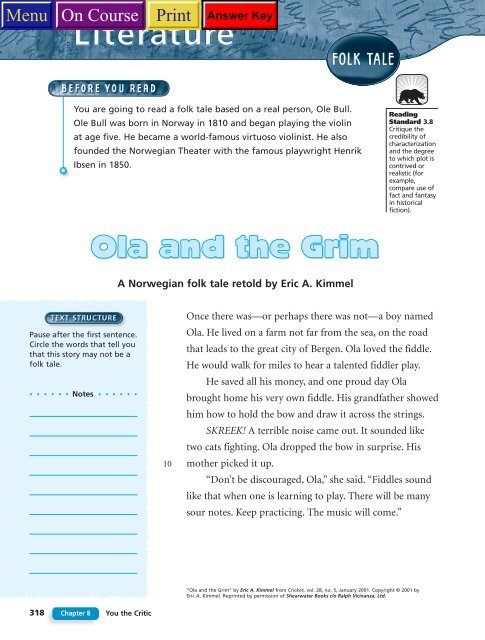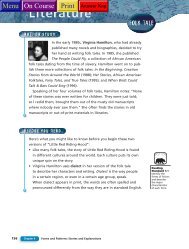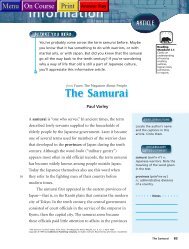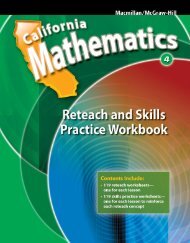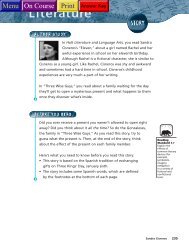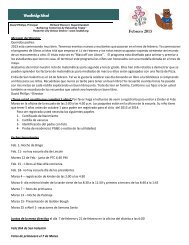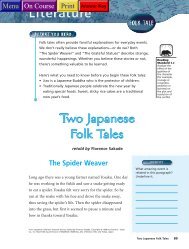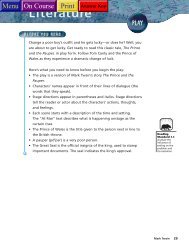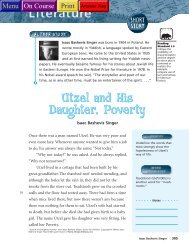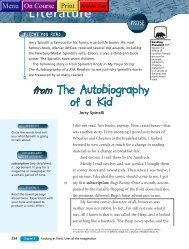Interactive Reading
Interactive Reading
Interactive Reading
Create successful ePaper yourself
Turn your PDF publications into a flip-book with our unique Google optimized e-Paper software.
You are going to read a folk tale based on a real person, Ole Bull.<br />
Ole Bull was born in Norway in 1810 and began playing the violin<br />
at age five. He became a world-famous virtuoso violinist. He also<br />
founded the Norwegian Theater with the famous playwright Henrik<br />
Ibsen in 1850.<br />
Pause after the first sentence.<br />
Circle the words that tell you<br />
that this story may not be a<br />
folk tale.<br />
• • • • • • Notes • • • • • •<br />
318 Chapter 8 You the Critic<br />
A Norwegian folk tale retold by Eric A. Kimmel<br />
10<br />
<strong>Reading</strong><br />
Standard 3.8<br />
Critique the<br />
credibility of<br />
characterization<br />
and the degree<br />
to which plot is<br />
contrived or<br />
realistic (for<br />
example,<br />
compare use of<br />
fact and fantasy<br />
in historical<br />
fiction).<br />
Once there was—or perhaps there was not—a boy named<br />
Ola. He lived on a farm not far from the sea, on the road<br />
that leads to the great city of Bergen. Ola loved the fiddle.<br />
He would walk for miles to hear a talented fiddler play.<br />
He saved all his money, and one proud day Ola<br />
brought home his very own fiddle. His grandfather showed<br />
him how to hold the bow and draw it across the strings.<br />
SKREEK! A terrible noise came out. It sounded like<br />
two cats fighting. Ola dropped the bow in surprise. His<br />
mother picked it up.<br />
“Don’t be discouraged, Ola,” she said. “Fiddles sound<br />
like that when one is learning to play. There will be many<br />
sour notes. Keep practicing. The music will come.”<br />
“Ola and the Grim” by Eric A. Kimmel from Cricket, vol. 28, no. 5, January 2001. Copyright © 2001 by<br />
Eric A. Kimmel. Reprinted by permission of Shearwater Books c/o Ralph Vicinanza, Ltd.
20<br />
30<br />
40<br />
Ola practiced and practiced. Whenever he found a<br />
spare moment, he took his fiddle and played. He practiced<br />
in the barn and in the shade of haystacks until his father<br />
asked him to stop. His fiddling frightened the animals. The<br />
cows stopped giving milk. The hens stopped laying eggs.<br />
The sheep scattered, and the sheepdogs that herded them<br />
ran off and were nowhere to be found.<br />
From then on, Ola practiced away from the farm. He<br />
sat under trees in the forest and on lonely rocks at the<br />
seashore. Crabs scurried into the surf. Seals dived deep. Sea<br />
gulls screamed overhead. But Ola persisted, even when the<br />
seabirds spattered him with their droppings. He kept<br />
sawing away at his fiddle. Ola practiced hour after hour,<br />
day after day. None of it did any good. He still played as<br />
badly as ever. His fiddle sounded like roosters crowing,<br />
donkeys braying, oxen bellowing, wagons with axles that<br />
needed greasing—everything but what a fiddle should<br />
sound like. His family covered their ears. No one wanted<br />
to tell Ola to give up. But everyone hoped he would.<br />
One day there was a wedding at a neighboring farm.<br />
A fiddler came all the way from Bergen. All the guests<br />
agreed he was the finest fiddler they had ever heard.<br />
While the man rested between dances, Ola came up<br />
and spoke to him.<br />
“Sir, can you give me some advice? I want to be a<br />
fiddler like you and make everybody merry. I practice<br />
and practice, but I never get any better, no matter how<br />
hard I try. Everything sounds like noise. I can’t even keep<br />
my fiddle in tune. Can you tell me what to do?”<br />
Pause at line 20. Ola’s<br />
audience extends beyond<br />
his family. Do you think the<br />
reactions of the animals are<br />
possible?<br />
persisted (p¥r •sist√¥d) v.:<br />
kept on.<br />
Pause at line 32. Underline<br />
the similes the writer uses<br />
to let us know what Ola’s<br />
fiddling sounded like. (Can<br />
you add a simile to this list<br />
to describe how bad music<br />
sounds?)<br />
Ola and the Grim 319
A tankard (line 43) is a large<br />
drinking cup with a handle<br />
and often a hinged lid.<br />
A troll (line 51) is a figure in<br />
Scandinavian folklore. Trolls<br />
are from a race of imaginary<br />
beings, often with special<br />
powers or skills.<br />
What detail on this page<br />
explains the story’s title?<br />
• • • • • • Notes • • • • • •<br />
320 Chapter 8 You the Critic<br />
50<br />
60<br />
The fiddler put down his tankard. He leaned over<br />
to Ola and whispered in his ear, “How badly do you want<br />
to play?”<br />
“Oh, very badly, sir!”<br />
“I was once like you,” the fiddler said. “I, too, wanted<br />
to play badly. And I did. Very badly! So I went to see the<br />
fosse-grim.”<br />
“Who’s that?” Ola asked.<br />
“The fosse-grim is a troll. He lives below a waterfall.<br />
Sometimes, if you listen closely, you’ll hear him playing his<br />
harp. The grim is a master musician. He can play any<br />
instrument. He can teach you how to play your fiddle. But<br />
he won’t do it for nothing. You must bring him a gift. The<br />
greater the gift, the greater the learning.”<br />
“What sort of gift should I bring?” Ola asked.<br />
“The fosse-grim likes meat,” the fiddler said. “Bring<br />
him something to eat.”<br />
The next day Ola finished his chores early. He took his<br />
fiddle and set out for the mountains. “I’m going to practice<br />
awhile,” he told his family.<br />
“Come back before dark,” his father said. “I don’t want<br />
the trolls to get you.”<br />
“Take something to eat in case you get hungry,” his<br />
mother added.<br />
No one told Ola not to go. As much as they cared<br />
about him, they were grateful not to have to hear him<br />
practicing.
70<br />
80<br />
90<br />
Ola stopped at the smokehouse. He stuffed a large<br />
sausage into his knapsack. Then he set out, following the<br />
path that wound along the stream.<br />
The path took Ola high into the mountains. It led to<br />
the foot of a rushing waterfall.<br />
Ola stood by the falls, listening. He heard music in<br />
the tumbling water that sounded like notes played on a<br />
harp. The sweet, mysterious music sang to the waterfall.<br />
It danced in the silver spray. Ola had never heard anything<br />
so beautiful in his life. There is magic in this place, he<br />
thought.<br />
“Grim!” he called. “Fosse-Grim, are you here?”<br />
A curious creature emerged from the pool beneath the<br />
falls. Its skin was mottled green, and it cradled a harp in its<br />
arms. Strands of green, silky hair, like long threads of algae,<br />
hung to its shoulders. It drew its fingers across the harp and<br />
spoke in a voice like splashing water.<br />
“What do you want, boy?”<br />
“I need your help, Grim,” Ola said. “I want to play the<br />
fiddle so badly.”<br />
“Let me hear you.”<br />
Ola took his fiddle from his knapsack. Tuning the<br />
strings as best he could, he took up his bow and began<br />
to play.<br />
“Stop! Stop!” cried the grim. “You’re hurting my ears!<br />
There is nothing I can teach you, boy. You want to play<br />
badly. And you do!”<br />
Underline the words in the<br />
paragraph beginning at line<br />
75 that personify the music—<br />
that is, that describe the<br />
music doing things that only<br />
humans do.<br />
In the paragraph beginning<br />
at line 82, what similes does<br />
the writer use to help you<br />
imagine what the grim looks<br />
like? Underline them.<br />
Most folk tales have very<br />
strong plot lines. Folk tales<br />
focus more on the story than<br />
they do on the characters. At<br />
this point in the plot, what<br />
does the main character<br />
want? What problems does<br />
he have getting what he<br />
wants?<br />
mottled (mät√¥ld) adj.:<br />
streaked or spotted in<br />
different colors or shades.<br />
Algae (al√j≤) are microscopic<br />
organisms found in damp<br />
places.<br />
Ola and the Grim 321
Underline the simile in the<br />
paragraph beginning at line<br />
107 that helps you imagine<br />
how hard it was for Ola to<br />
tune his fiddle to the grim’s<br />
note.<br />
What simile is used later on<br />
this page to help you imagine<br />
what happened inside<br />
Ola’s head? Underline it.<br />
Pause at the end of the<br />
page. What part of Ola’s<br />
problem has been resolved?<br />
• • • • • • Notes • • • • • •<br />
322 Chapter 8 You the Critic<br />
100<br />
110<br />
120<br />
“Don’t mock me, Grim,” Ola said. “You know what I<br />
mean. I want to become a good fiddler. Can you help me?”<br />
“I can,” the grim said. “But I won’t do it for nothing.<br />
What did you bring me?”<br />
Ola held out the sausage. The grim snatched it right<br />
away. He bit off the end, “Ugh! Tough and stringy! Can’t<br />
you afford decent sausage, boy? Never mind. I’ll give you<br />
what it’s worth. I can at least teach you how to tune that<br />
fiddle. Listen closely. I’ll pluck a string on my harp. You<br />
match it. Let’s begin.”<br />
The grim plucked a note. Ola tried to tune his fiddle<br />
string to it, but the note slipped away. It was like trying to<br />
catch fish barehanded.<br />
“No, no, no!” the grim yelled. “That’s too high! Now<br />
you’re too low! What’s the matter with you? Are your ears<br />
blocked? Can you hear anything?”<br />
The grim stretched out his long, green arm. He pressed<br />
the palm of his hand against Ola’s ear. Ola felt something<br />
inside his head SNAP! It popped and crackled like ice<br />
breaking on a pond. Suddenly he heard the sounds around<br />
him clearly. It was as if he were listening for the first time.<br />
“Try again,” the grim said.<br />
This time Ola tuned his strings effortlessly. And they<br />
stayed in tune, no matter how long he played.<br />
“Thank you, Grim,” Ola said.<br />
“Keep practicing,” the grim snorted as he dived<br />
beneath the ripples.
130<br />
140<br />
Ola raced home. He tuned his fiddle and sawed away.<br />
“Listen to me now!” he cried to everyone. “I can play in<br />
tune.” And he did, for the first time!<br />
However, there is more to fiddling than playing in<br />
tune. Ola still squeaked and scraped. His timing was off;<br />
his fingering incorrect. Every song he attempted became<br />
a hopeless muddle.<br />
“Keep practicing, Ola. You’re getting better,” his<br />
mother said.<br />
But Ola knew that wasn’t true. He could not hope to<br />
get anywhere on his own, no matter how hard he practiced.<br />
It was time to visit the grim.<br />
Ola packed his knapsack and fiddle. He followed the<br />
stream up into the mountains. When he reached the<br />
waterfall, he called out, “Grim, come up from the pool!<br />
I need you!”<br />
The waters rippled. The fosse-grim appeared, cradling<br />
his harp. “What do you want, boy?”<br />
“I want to play the fiddle in the worst way. Help me,<br />
please!”<br />
The grim laughed. “You don’t need me. You already<br />
play in the worst way. You’re the worst fiddler I ever heard.<br />
You couldn’t get any worse if you tried.”<br />
“Don’t mock me, Grim!” Ola pleaded. “You know what<br />
I mean. Playing in tune is not enough. I need to know so<br />
much more.”<br />
Pause at line 130. What further<br />
problems does Ola have<br />
in his quest to learn to play<br />
the fiddle? Underline them.<br />
• • • • • • Notes • • • • • •<br />
Ola and the Grim 323
Pause at line 168. Underline<br />
the simile that describes<br />
how Ola felt as he played.<br />
Underline the simile that<br />
helps you hear the quality of<br />
the music Ola was able to<br />
play after his second lesson.<br />
adequate (ad√i •kw¥t) adj.:<br />
good enough.<br />
• • • • • • Notes • • • • • •<br />
Pause at the bottom of the<br />
page. Is this what Ola wants?<br />
324 Chapter 8 You the Critic<br />
150<br />
160<br />
170<br />
“Nothing buys nothing,” the grim replied. “What did<br />
you bring me?”<br />
“A whole leg of mutton!” Ola took the meat from his<br />
knapsack. He tossed it to the grim, who gnawed it down<br />
to the bone.<br />
“That’s worth something,” the grim finally said,<br />
smacking his lips. “Take out your fiddle. We’ll play<br />
together.”<br />
The grim came out of the pool. He sat beside Ola,<br />
pressing the boy’s fingers down with his left hand and<br />
pulling his wrist back and forth with his right.<br />
“Ow! You’re pinching me!” Ola cried.<br />
“Stop complaining! Open yourself to the music. Feel<br />
its wonder. Let it take you.”<br />
Ola played and played. The grim guided his fingers<br />
from note to note. Ola felt as if he had walked through a<br />
hidden door into a secret realm. He lost himself in the<br />
music that poured from his fiddle like a mountain brook<br />
streaming down a waterfall.<br />
At last the grim said, “Enough! I’ve given you a leg of<br />
mutton’s worth of music. Those tunes are in your fingers<br />
now. Practice every day so you don’t forget them.<br />
Otherwise, you’ll have to bring me another leg of mutton<br />
to have me teach you again.”<br />
“Will I be a good fiddler?” Ola asked.<br />
“Adequate. Nothing more. What do you expect for a<br />
leg of mutton? You’ll earn your living playing at weddings<br />
and festivals. At least people won’t run away when you take<br />
out your fiddle. Isn’t that what you wanted?”<br />
“I guess so,” said Ola.
180<br />
190<br />
200<br />
210<br />
But it wasn’t. Everyone loved Ola’s playing now. His family<br />
begged him to take out his fiddle in the evening, after<br />
the day’s work was done. Neighbors invited him to their<br />
farms to play for them. Whenever a joyous occasion arose,<br />
people sent for Ola to play. “You’re a great fiddler, Ola!”<br />
everyone said.<br />
It wasn’t so, and Ola knew it. A vast gulf lay between<br />
what Ola wanted to play and what he could play. He heard<br />
music everywhere: in the wind, in trees, rippling fields of<br />
wheat and rushing streams, in surging ocean waves and<br />
quiet mountain meadows. He tried to capture it with his<br />
fiddle, but the notes slipped away. Ola felt like a fisherman<br />
carried out to sea by a running tide. He sees the land clearly,<br />
but he cannot reach it, no matter how hard he rows.<br />
“I must visit the fosse-grim,” Ola said to himself.<br />
Once more Ola followed the stream. He struggled up<br />
the path, bent double with the weight of a whole side of<br />
beef on his shoulders.<br />
“Grim, come out! I need you!” Ola called to the<br />
waterfall.<br />
The fosse-grim emerged from the pool. “What do you<br />
want, boy?”<br />
“Grim, it is not enough to be a good fiddler. I want to<br />
be a great fiddler. I want to be able to play the music I hear,<br />
the music I love. I will practice night and day. I will do<br />
anything you ask. Look! I have brought you half of a whole<br />
steer. If it is not enough, I will go back down the mountain<br />
for more. Tell me what I must do, Grim, to become the<br />
fiddler I want to be.”<br />
“Put down the beef and take out your fiddle,” the grim<br />
said. He climbed out of the pool to sit beside Ola. “You and<br />
Pause at line 193.<br />
Underline the extended<br />
simile that the writer uses<br />
to help us imagine how Ola<br />
feels about his music.<br />
Pause at line 194. What is it<br />
that Ola wants now? What<br />
will he do to find it?<br />
Have you noticed that the<br />
amount of food Ola brings<br />
the grim gets larger and<br />
larger? What has he brought<br />
the grim now?<br />
Ola and the Grim 325
What does the grim mean<br />
when he says, “Did you<br />
expect to buy greatness for<br />
a side of beef” (lines<br />
222–223)? Do you agree that<br />
“Pain is the price of genius”?<br />
How has Ola’s problem been<br />
resolved?<br />
326 Chapter 8 You the Critic<br />
220<br />
230<br />
I will play together. Keep playing, no matter what happens.<br />
Play until I tell you to stop.”<br />
The grim took hold of Ola’s wrist and fingers. Together<br />
they began to play: songs, scales, exercises. Hour after hour.<br />
Ola’s wrists began to cramp.<br />
“Let me rest, Grim! My hands ache!”<br />
“Keep playing!” The grim pulled Ola’s arm back and<br />
forth. He pressed the boy’s fingers onto the strings until<br />
blisters rose from his fingertips.<br />
“Let me go, Grim! You’re torturing me! This is more<br />
than I can endure!”<br />
“What a fool you are! Did you expect to buy greatness<br />
for a side of beef? Pain is the price of genius. The great ones<br />
of the world are always disappointed, neglected, misunderstood.<br />
And still they keep on. But look at you! A few little<br />
blisters and you’re ready to quit. Go ahead! What do I care?<br />
I have your beef. Dolts like you keep me well fed.”<br />
Ola set his jaw. He clamped the fiddle beneath his<br />
chin. “No. I will go on.”<br />
“Then play!”<br />
Ola and the grim played through the night until the sun<br />
came up. By then, Ola’s hands had tightened into claws, the<br />
fiddle’s strings had snapped, and the bow hung in pieces.<br />
“But you’re a real fiddler now,” said the grim. “Go!<br />
Make your way in the world. I have nothing more to<br />
teach you.”
240<br />
250<br />
Ola left without a word of thanks. He felt too weary<br />
to speak. He stumbled down the mountain, and it was<br />
many weeks before he had the strength to take up his<br />
fiddle again.<br />
But when he did . . .<br />
Years later, a special performance took place in Bergen’s<br />
concert hall. People came from all over Scandinavia to hear<br />
Ole Bull, Norway’s most famous violinist. All the critics<br />
agreed, “Ole Bull has no peer. He is the finest musician in<br />
Scandinavia. The best in Europe. The greatest in the world.”<br />
At the reception afterward a small, odd-looking man<br />
with a mottled green complexion was seen heaping his<br />
plate at the smorgasbord in back of the hall. A Swedish<br />
countess asked him, “Did you enjoy the concert? It<br />
astonishes me that a human being can possess such<br />
natural talent.”<br />
To which the odd little man replied, “Talent? Bah! It’s<br />
courage, dedication, and hard work. Ola couldn’t play a<br />
note when we began. You’ve no idea what I went through<br />
just to teach him to tune his fiddle!”<br />
The fosse-grim is a creature<br />
of fantasy, but how is the<br />
relationship between the<br />
fosse-grim and Ola realistic?<br />
The concluding section of the<br />
story in Bergen’s concert hall<br />
contains a mix of fact and<br />
fantasy. What do you think is<br />
actually true here?<br />
Ola and the Grim 327
Credibility Part of this folk tale is obviously fantasy. The main character,<br />
however, is based on an actual person. How credible is the<br />
character of Ola as he is portrayed in the story? Consider his feelings<br />
and his actions. Think about his decisions to keep on trying. Is this<br />
the way a real-life character would behave when he or she wants<br />
something very, very much? In a sentence, tell how credible or contrived<br />
you found the character of Ola. Give three examples of his<br />
actions or feelings to support your evaluation.<br />
Evaluation of the Character Ola<br />
Story detail 1:<br />
Story detail 2:<br />
Story detail 3:<br />
Theme In a few sentences, sum up what you see as the theme, or<br />
message, of this folk tale. Does the message apply only to artists, or<br />
does it apply to everyone? Cite specific passages from the story in<br />
your answer.<br />
Personal Word List Astound your friends by using this selection’s<br />
words in conversation. Of course, write the words in your Personal<br />
Word List.<br />
Personal <strong>Reading</strong> Log As you enter this folk tale in your Personal<br />
<strong>Reading</strong> Log, note the uses of figurative language that you liked.<br />
Give yourself another 4 points on the <strong>Reading</strong> Meter.<br />
Checklist for Standards Mastery Use the Checklist for Standards<br />
Mastery to see how much you have learned this year.<br />
328 Chapter 8 You the Critic
Ola and the Grim <strong>Interactive</strong> <strong>Reading</strong>, page 318<br />
Go Beyond a Literary Text<br />
Biographical Notes Research the life of your favorite musician.<br />
Fill in the following chart with details you find in the library or<br />
online. Share your findings with the class.<br />
Musician’s Name:<br />
Birth/Death dates:<br />
Where born:<br />
Parents and family life:<br />
Education:<br />
Notable accomplishments:<br />
Hobbies:<br />
Quotation:<br />
Graphic Organizer 329
Ola and the Grim<br />
Eric A. Kimmel ■ page 318<br />
■ Tell students that they are going to read a Norwegian folk tale<br />
based on a real person, Ole Bull. Discuss with students any folk<br />
heroes they may already know about, such as Johnny Appleseed<br />
and Davy Crockett, who were also actual people.<br />
■ Have students read the Before You Read note, and explain to them<br />
that the famous violinist Ole Bull started out as a child prodigy.<br />
■ Remind students that as they read they will use the “Save the Last<br />
Word for Me” strategy to help them critique the story’s plot and<br />
characterization.<br />
■ Point out to students the first Text Structure note in the side column,<br />
and have them circle the words that bring into question the<br />
authenticity of this story. Ask them if the writer’s depiction of Ola’s<br />
situation seems realistic or not.<br />
■ Direct students’ attention to the Evaluate note in the side column.<br />
Are the animals’ reactions possible? Point out that the writer is<br />
using exaggeration for humorous effect.<br />
■ Have students read the story independently. Remind them to write<br />
their responses to the side-column notes in their books.<br />
■ After students finish reading, divide the class into small groups to<br />
discuss their responses.<br />
■ As a whole class, ask students to comment on what they found<br />
realistic or unrealistic about the story’s characterization and plot.<br />
■ Have students return to the text of “Ola and the Grim” and mark it<br />
with their own notes and comments.<br />
■ Evaluate students’ mastery of “Ola and the Grim” by having them<br />
complete the Vocabulary Check on Teacher’s Edition page 108 and<br />
the Comprehension Check on Teacher’s Edition page 109.<br />
■ Assign the Biographical Notes project on <strong>Interactive</strong> <strong>Reading</strong> page<br />
329 as an extension activity.<br />
DIFFERENTIATING INSTRUCTION<br />
Ola and the<br />
Grim<br />
■ Learners Having Difficulty<br />
Read or play the Audio CD of<br />
at least the first five or six<br />
paragraphs for these learners.<br />
You might want to pair students<br />
with advanced learners<br />
to help them respond to the<br />
notes in the side columns.<br />
■ Benchmark Students These<br />
students should have little difficulty<br />
with this selection. As<br />
students read, have them take<br />
notes about details that they<br />
find realistic or unbelievable.<br />
■ Advanced Students These<br />
students should find this<br />
selection easy to read. You<br />
might want to have them<br />
extend the reading by doing a<br />
research project on Ole Bull.<br />
TEACHER TO TEACHER<br />
If students find it difficult to<br />
identify an important passage<br />
for their “Save the Last Word for<br />
Me” response, point out two<br />
possible choices in the text, and<br />
ask them to choose the one that<br />
they prefer.<br />
Chapter 8 101
Name ______________________________ Class _____________ Date _____________<br />
Ola and the Grim<br />
■ <strong>Interactive</strong> <strong>Reading</strong>, page 318<br />
<strong>Reading</strong> Standard 1.4 Know common affixes, and use this<br />
knowledge to analyze the meaning of words.<br />
adequate, adjective<br />
mottled, adjective<br />
persisted, verb<br />
108 <strong>Interactive</strong> <strong>Reading</strong><br />
Vocabulary Development<br />
Vocabulary Check<br />
A. Words in Context<br />
Use words from the word box to complete the paragraph below. Use each<br />
word only once.<br />
The fiddler (1) _______________ with his advice to Ola. “If you want to be a<br />
fiddler,” he told Ola, “you have to visit the grim who lives below a waterfall. He’ll<br />
teach you.” The grim turned out to be an odd-looking creature with<br />
(2) _______________ skin. Ola played terribly on his fiddle for the grim, but after a<br />
while he learned to be (3) _______________, and then he became excellent.<br />
B. Affixes: The Suffix -ly<br />
The suffix -ly means “in a certain way.” Nicely, for example, means “in a nice way.”<br />
Underline the word that contains the suffix -ly in each sentence below. Then, write<br />
the word’s definition below.<br />
1. He still played as badly as ever. (Lines 27–28)<br />
2. Sometimes, if you listen closely, you’ll hear him<br />
playing his harp. (Lines 52–53)<br />
3. He heard the sounds around him clearly. (Lines 116–117)<br />
4. “That’s worth something,” the grim finally said,<br />
smacking his lips. (Lines 155–156)<br />
good enough<br />
streaked or spotted in different colors or shades<br />
kept on<br />
Copyright © by Holt, Rinehart and Winston. All rights reserved.
Copyright © by Holt, Rinehart and Winston. All rights reserved.<br />
Name ______________________________ Class _____________ Date _____________<br />
Ola and the Grim<br />
■ <strong>Interactive</strong> <strong>Reading</strong>, page 318<br />
<strong>Reading</strong> Standard 3.8 Critique the credibility of characterization<br />
and the degree to which plot is contrived or realistic (e.g., compare<br />
use of fact and fantasy in historical fiction).<br />
credible<br />
contrived<br />
realistic<br />
fantasy<br />
Academic Vocabulary<br />
Comprehension Check<br />
believable<br />
obviously artificial and not true to real life<br />
showing people and things as they really appear to be<br />
imaginary; not real<br />
A. Circle the letter of the best response to each item below.<br />
1. Which of the following statements best describes the<br />
characters of Ola and the fosse-grim?<br />
A Both characters are completely realistic.<br />
B Ola is realistic, and the fosse-grim is fantastic.<br />
C The fosse-grim is realistic, and Ola is fantastic.<br />
D Both characters are totally built on fantasy.<br />
2. Which plot event from the story seems the least realistic?<br />
F Ola dropped the bow in surprise.<br />
G He stuffed a large sausage into his knapsack.<br />
H Ola’s wrists began to cramp.<br />
J Ola felt something inside his head snap!<br />
3. Which detail from the story is credible?<br />
A The grim taught Ola to play like a master in only three lessons.<br />
B Ola practiced and practiced because he wanted to play more than anything.<br />
C Ola’s fiddling frightened the animals, causing the cows to stop giving milk.<br />
D The grim was a curious green creature with stands of green, silky hair.<br />
B. In “Ola and the Grim,” do people behave the way they do in real life? Explain.<br />
Chapter 8 109
Chapter 8<br />
Practice Read: My Field Trip<br />
to Pompeii<br />
Vocabulary Check, page 102<br />
A: 1. vaccinate<br />
2. compress<br />
3. arena<br />
B: 1. one who visits<br />
2. one who sells<br />
3. one who speaks<br />
4. one who uses a sword<br />
Comprehension Check, page 103<br />
A: 1. C<br />
2. G<br />
3. A<br />
4. J<br />
B: Answers will vary. Sample answer: Even though<br />
time travel is a fantasy, the writer makes the<br />
characters credible. The narrator is especially<br />
believable because he is upset by the suffering he<br />
sees in the time travel and he cannot interfere.<br />
Utzel and His Daughter, Poverty<br />
Vocabulary Check, page 104<br />
A: 1. maintained<br />
2. charitable<br />
3. consternation<br />
4. industrious<br />
B: 1. full of charity<br />
2. full of misery<br />
3. full of wealth<br />
Comprehension Check, page 105<br />
A: 1. A<br />
2. G<br />
3. D<br />
B: Answers will vary. Sample answer: Utzel changed<br />
because he loved his daughter. He did not want<br />
to work, but “it was even worse to have new<br />
shoes and go around barefoot.”<br />
I Never Have Enough Time<br />
Vocabulary Check, page 106<br />
A: 1. measly<br />
2. procrastinate<br />
3. priorities<br />
B: 1. exchanging views of each other<br />
2. the act of managing time<br />
3. the act of assigning something<br />
Comprehension Check, page 107<br />
A: 1. C<br />
2. J<br />
3. C<br />
4. F<br />
B: Answers will vary. Sample answer: I would tell<br />
my friend to keep a schedule, either an electronic<br />
one or a notepad. I would also tell him to do the<br />
most important activity first and save the least<br />
important activity for last.<br />
Ola and the Grim<br />
Vocabulary Check, page 108<br />
A: 1. persisted<br />
2. mottled<br />
3. adequate<br />
B: 1. in a bad manner<br />
2. in a careful manner<br />
3. in a clear manner<br />
4. in a concluding manner<br />
Comprehension Check, page 109<br />
A: 1. B<br />
2. J<br />
3. B<br />
B: Answers will vary. Sample answer: Events don’t<br />
happen the way they do in real life in “Ola and<br />
the Grim.” Ola learns to play like a virtuoso in<br />
three lessons—in real life it takes years of lessons<br />
to learn how to play.<br />
Answer Key 117
Pause at line 20. Ola’s<br />
audience extends beyond<br />
his family. Do you think the<br />
reactions of the animals are<br />
possible?<br />
Students should<br />
recognize that<br />
Ola practiced and practiced. Whenever he found a<br />
spare moment, he took his fiddle and played. He practiced<br />
in the barn and in the shade of haystacks until his father<br />
asked him to stop. His fiddling frightened the animals. The<br />
cows stopped giving milk. The hens stopped laying eggs.<br />
The sheep scattered, and the sheepdogs that herded them<br />
ran off and were nowhere to be found.<br />
From then on, Ola practiced away from the farm. He<br />
sat under trees in the forest and on lonely rocks at the<br />
seashore. Crabs scurried into the surf. Seals dived deep. Sea<br />
gulls screamed overhead. But Ola persisted, even when the<br />
seabirds spattered him with their droppings. He kept<br />
sawing away at his fiddle. Ola practiced hour after hour,<br />
day after day. None of it did any good. He still played as<br />
badly as ever. His fiddle sounded like roosters crowing,<br />
donkeys braying, oxen bellowing, wagons with axles that<br />
needed greasing—everything but what a fiddle should<br />
sound like. His family covered their ears. No one wanted<br />
to tell Ola to give up. But everyone hoped he would.<br />
One day there was a wedding at a neighboring farm.<br />
A fiddler came all the way from Bergen. All the guests<br />
agreed he was the finest fiddler they had ever heard.<br />
While the man rested between dances, Ola came up<br />
and spoke to him.<br />
“Sir, can you give me some advice? I want to be a<br />
fiddler like you and make everybody merry. I practice<br />
and practice, but I never get any better, no matter how<br />
hard I try. Everything sounds like noise. I can’t even keep<br />
my fiddle in tune. Can you tell me what to do?”<br />
20<br />
although Ola’s playing<br />
may have disturbed<br />
<strong>Reading</strong><br />
Standard 3.8<br />
Critique the<br />
credibility of<br />
characterization<br />
and the degree<br />
to which plot is<br />
contrived or<br />
realistic (for<br />
example,<br />
compare use of<br />
fact and fantasy<br />
in historical<br />
fiction).<br />
You are going to read a folk tale based on a real person, Ole Bull.<br />
Ole Bull was born in Norway in 1810 and began playing the violin<br />
at age five. He became a world-famous virtuoso violinist. He also<br />
founded the Norwegian Theater with the famous playwright Henrik<br />
Ibsen in 1850.<br />
the animals, the<br />
author is using<br />
exaggeration here<br />
for humorous effect.<br />
A Norwegian folk tale retold by Eric A. Kimmel<br />
30<br />
persisted (p¥r •sist√¥d) v.:<br />
kept on.<br />
Pause at line 32. Underline<br />
the similes the writer uses<br />
to let us know what Ola’s<br />
fiddling sounded like. (Can<br />
you add a simile to this list<br />
to describe how bad music<br />
sounds?)<br />
Students’ similies will<br />
40<br />
vary.<br />
Once there was—or perhaps there was not—a boy named<br />
Ola. He lived on a farm not far from the sea, on the road<br />
that leads to the great city of Bergen. Ola loved the fiddle.<br />
He would walk for miles to hear a talented fiddler play.<br />
He saved all his money, and one proud day Ola<br />
brought home his very own fiddle. His grandfather showed<br />
him how to hold the bow and draw it across the strings.<br />
SKREEK! A terrible noise came out. It sounded like<br />
two cats fighting. Ola dropped the bow in surprise. His<br />
mother picked it up.<br />
“Don’t be discouraged, Ola,” she said. “Fiddles sound<br />
like that when one is learning to play. There will be many<br />
sour notes. Keep practicing. The music will come.”<br />
Pause after the first sentence.<br />
Circle the words that tell you<br />
that this story may not be a<br />
folk tale.<br />
• • • • • • Notes • • • • • •<br />
10<br />
8<br />
Pupil Pages 292–329<br />
Chapter<br />
“Ola and the Grim” by Eric A. Kimmel from Cricket, vol. 28, no. 5, January 2001. Copyright © 2001 by<br />
Eric A. Kimmel. Reprinted by permission of Shearwater Books c/o Ralph Vicinanza, Ltd.<br />
Pupil Pages with Answers 279<br />
Ola and the Grim 319<br />
318 Chapter 8 You the Critic
Ola stopped at the smokehouse. He stuffed a large<br />
sausage into his knapsack. Then he set out, following the<br />
path that wound along the stream.<br />
The path took Ola high into the mountains. It led to<br />
the foot of a rushing waterfall.<br />
Ola stood by the falls, listening. He heard music in<br />
the tumbling water that sounded like notes played on a<br />
harp. The sweet, mysterious music sang to the waterfall.<br />
It danced in the silver spray. Ola had never heard anything<br />
so beautiful in his life. There is magic in this place, he<br />
thought.<br />
“Grim!” he called. “Fosse-Grim, are you here?”<br />
A curious creature emerged from the pool beneath the<br />
falls. Its skin was mottled green, and it cradled a harp in its<br />
arms. Strands of green, silky hair, like long threads of algae,<br />
hung to its shoulders. It drew its fingers across the harp and<br />
spoke in a voice like splashing water.<br />
“What do you want, boy?”<br />
“I need your help, Grim,” Ola said. “I want to play the<br />
fiddle so badly.”<br />
“Let me hear you.”<br />
Ola took his fiddle from his knapsack. Tuning the<br />
strings as best he could, he took up his bow and began<br />
to play.<br />
“Stop! Stop!” cried the grim. “You’re hurting my ears!<br />
There is nothing I can teach you, boy. You want to play<br />
70<br />
Underline the words in the<br />
paragraph beginning at line<br />
75 that personify the music—<br />
that is, that describe the<br />
music doing things that only<br />
humans do.<br />
In the paragraph beginning<br />
at line 82, what similes does<br />
the writer use to help you<br />
imagine what the grim looks<br />
like? Underline them.<br />
280 <strong>Interactive</strong> <strong>Reading</strong>: Teacher’s Edition<br />
80<br />
Most folk tales have very<br />
strong plot lines. Folk tales<br />
focus more on the story than<br />
they do on the characters. At<br />
this point in the plot, what<br />
does the main character<br />
want? What problems does<br />
he have getting what he<br />
wants?<br />
He wants to play the<br />
The fiddler put down his tankard. He leaned over<br />
to Ola and whispered in his ear, “How badly do you want<br />
to play?”<br />
“Oh, very badly, sir!”<br />
“I was once like you,” the fiddler said. “I, too, wanted<br />
to play badly. And I did. Very badly! So I went to see the<br />
fosse-grim.”<br />
“Who’s that?” Ola asked.<br />
“The fosse-grim is a troll. He lives below a waterfall.<br />
Sometimes, if you listen closely, you’ll hear him playing his<br />
harp. The grim is a master musician. He can play any<br />
instrument. He can teach you how to play your fiddle. But<br />
he won’t do it for nothing. You must bring him a gift. The<br />
greater the gift, the greater the learning.”<br />
“What sort of gift should I bring?” Ola asked.<br />
“The fosse-grim likes meat,” the fiddler said. “Bring<br />
A tankard (line 43) is a large<br />
drinking cup with a handle<br />
and often a hinged lid.<br />
A troll (line 51) is a figure in<br />
Scandinavian folklore. Trolls<br />
are from a race of imaginary<br />
beings, often with special<br />
powers or skills.<br />
50<br />
What detail on this page<br />
explains the story’s title?<br />
The word grim in the<br />
title refers to the troll.<br />
him something to eat.”<br />
fiddle. The problem is<br />
that he plays badly.<br />
90<br />
mottled (mät√¥ld) adj.:<br />
streaked or spotted in<br />
different colors or shades.<br />
badly. And you do!”<br />
The next day Ola finished his chores early. He took his<br />
fiddle and set out for the mountains. “I’m going to practice<br />
awhile,” he told his family.<br />
“Come back before dark,” his father said. “I don’t want<br />
the trolls to get you.”<br />
“Take something to eat in case you get hungry,” his<br />
mother added.<br />
No one told Ola not to go. As much as they cared<br />
about him, they were grateful not to have to hear him<br />
practicing.<br />
60<br />
• • • • • • Notes • • • • • •<br />
Chapter 8<br />
Pupil Pages 292–329<br />
Algae (al√j≤) are microscopic<br />
organisms found in damp<br />
places.<br />
Ola and the Grim 321<br />
320 Chapter 8 You the Critic
Ola raced home. He tuned his fiddle and sawed away.<br />
“Listen to me now!” he cried to everyone. “I can play in<br />
“Don’t mock me, Grim,” Ola said. “You know what I<br />
mean. I want to become a good fiddler. Can you help me?”<br />
Pause at line 130. What further<br />
problems does Ola have<br />
in his quest to learn to play<br />
the fiddle? Underline them.<br />
tune.” And he did, for the first time!<br />
However, there is more to fiddling than playing in<br />
“I can,” the grim said. “But I won’t do it for nothing.<br />
What did you bring me?”<br />
100<br />
• • • • • • Notes • • • • • •<br />
tune. Ola still squeaked and scraped. His timing was off;<br />
his fingering incorrect. Every song he attempted became<br />
Ola held out the sausage. The grim snatched it right<br />
away.He bit off the end, “Ugh! Tough and stringy! Can’t<br />
Underline the simile in the<br />
paragraph beginning at line<br />
107 that helps you imagine<br />
how hard it was for Ola to<br />
tune his fiddle to the grim’s<br />
note.<br />
a hopeless muddle.<br />
“Keep practicing, Ola. You’re getting better,” his<br />
130<br />
you afford decent sausage, boy? Never mind. I’ll give you<br />
what it’s worth. I can at least teach you how to tune that<br />
What simile is used later on<br />
this page to help you imagine<br />
what happened inside<br />
Ola’s head? Underline it.<br />
mother said.<br />
But Ola knew that wasn’t true. He could not hope to<br />
fiddle. Listen closely. I’ll pluck a string on my harp. You<br />
match it. Let’s begin.”<br />
get anywhere on his own, no matter how hard he practiced.<br />
It was time to visit the grim.<br />
Ola packed his knapsack and fiddle. He followed the<br />
stream up into the mountains. When he reached the<br />
waterfall, he called out, “Grim, come up from the pool!<br />
I need you!”<br />
The waters rippled. The fosse-grim appeared, cradling<br />
his harp. “What do you want, boy?”<br />
The grim plucked a note. Ola tried to tune his fiddle<br />
string to it, but the note slipped away. It was like trying to<br />
Pause at the end of the<br />
page. What part of Ola’s<br />
problem has been resolved?<br />
catch fish barehanded.<br />
“No, no, no!” the grim yelled. “That’s too high! Now<br />
110<br />
At least he can now<br />
you’re too low! What’s the matter with you? Are your ears<br />
blocked? Can you hear anything?”<br />
tune his fiddle.<br />
140<br />
The grim stretched out his long, green arm. He pressed<br />
the palm of his hand against Ola’s ear. Ola felt something<br />
“I want to play the fiddle in the worst way. Help me,<br />
please!”<br />
The grim laughed. “You don’t need me. You already<br />
play in the worst way. You’re the worst fiddler I ever heard.<br />
You couldn’t get any worse if you tried.”<br />
“Don’t mock me, Grim!” Ola pleaded. “You know what<br />
I mean. Playing in tune is not enough. I need to know so<br />
inside his head SNAP! It popped and crackled like ice<br />
breaking on a pond. Suddenly he heard the sounds around<br />
him clearly. It was as if he were listening for the first time.<br />
“Try again,” the grim said.<br />
• • • • • • Notes • • • • • •<br />
This time Ola tuned his strings effortlessly. And they<br />
stayed in tune, no matter how long he played.<br />
120<br />
much more.”<br />
“Thank you, Grim,” Ola said.<br />
“Keep practicing,” the grim snorted as he dived<br />
beneath the ripples.<br />
Chapter 8<br />
Pupil Pages 292–329<br />
Pupil Pages with Answers 281<br />
Ola and the Grim 323<br />
322 Chapter 8 You the Critic
But it wasn’t. Everyone loved Ola’s playing now. His family<br />
begged him to take out his fiddle in the evening, after<br />
the day’s work was done. Neighbors invited him to their<br />
farms to play for them. Whenever a joyous occasion arose,<br />
people sent for Ola to play. “You’re a great fiddler, Ola!”<br />
everyone said.<br />
It wasn’t so, and Ola knew it. A vast gulf lay between<br />
what Ola wanted to play and what he could play. He heard<br />
music everywhere: in the wind, in trees, rippling fields of<br />
wheat and rushing streams, in surging ocean waves and<br />
quiet mountain meadows. He tried to capture it with his<br />
fiddle, but the notes slipped away. Ola felt like a fisherman<br />
carried out to sea by a running tide. He sees the land clearly,<br />
but he cannot reach it, no matter how hard he rows.<br />
“I must visit the fosse-grim,” Ola said to himself.<br />
Once more Ola followed the stream. He struggled up<br />
the path, bent double with the weight of a whole side of<br />
beef on his shoulders.<br />
180<br />
“Nothing buys nothing,” the grim replied. “What did<br />
you bring me?”<br />
150<br />
Pause at line 193.<br />
Underline the extended<br />
simile that the writer uses<br />
to help us imagine how Ola<br />
feels about his music.<br />
“A whole leg of mutton!” Ola took the meat from his<br />
knapsack. He tossed it to the grim, who gnawed it down<br />
to the bone.<br />
“That’s worth something,” the grim finally said,<br />
Pause at line 168. Underline<br />
the simile that describes<br />
how Ola felt as he played.<br />
Underline the simile that<br />
helps you hear the quality of<br />
the music Ola was able to<br />
play after his second lesson.<br />
smacking his lips. “Take out your fiddle. We’ll play<br />
together.”<br />
Pause at line 194. What is it<br />
that Ola wants now? What<br />
will he do to find it?<br />
Ola wants greatness as<br />
The grim came out of the pool. He sat beside Ola,<br />
pressing the boy’s fingers down with his left hand and<br />
adequate (ad√i •kw¥t) adj.:<br />
good enough.<br />
282 <strong>Interactive</strong> <strong>Reading</strong>: Teacher’s Edition<br />
a fiddle player. He will<br />
190<br />
probably find the<br />
pulling his wrist back and forth with his right.<br />
“Ow! You’re pinching me!” Ola cried.<br />
“Stop complaining! Open yourself to the music. Feel<br />
160<br />
• • • • • • Notes • • • • • •<br />
fosse-grim and beg<br />
for another lesson.<br />
its wonder. Let it take you.”<br />
Ola played and played. The grim guided his fingers<br />
from note to note. Ola felt as if he had walked through a<br />
hidden door into a secret realm. He lost himself in the<br />
“Grim, come out! I need you!” Ola called to the<br />
music that poured from his fiddle like a mountain brook<br />
streaming down a waterfall.<br />
waterfall.<br />
The fosse-grim emerged from the pool. “What do you<br />
want, boy?”<br />
“Grim, it is not enough to be a good fiddler. I want to<br />
be a great fiddler. I want to be able to play the music I hear,<br />
the music I love. I will practice night and day. I will do<br />
anything you ask. Look! I have brought you half of a whole<br />
steer. If it is not enough, I will go back down the mountain<br />
for more. Tell me what I must do, Grim, to become the<br />
fiddler I want to be.”<br />
“Put down the beef and take out your fiddle,” the grim<br />
said. He climbed out of the pool to sit beside Ola. “You and<br />
200<br />
At last the grim said, “Enough! I’ve given you a leg of<br />
mutton’s worth of music. Those tunes are in your fingers<br />
170<br />
now. Practice every day so you don’t forget them.<br />
Otherwise, you’ll have to bring me another leg of mutton<br />
Have you noticed that the<br />
amount of food Ola brings<br />
the grim gets larger and<br />
larger? What has he brought<br />
the grim now?<br />
Pause at the bottom of the<br />
page. Is this what Ola wants?<br />
to have me teach you again.”<br />
“Will I be a good fiddler?” Ola asked.<br />
“Adequate. Nothing more. What do you expect for a<br />
Probably not. He<br />
seems unsure.<br />
a half of a steer<br />
leg of mutton? You’ll earn your living playing at weddings<br />
and festivals. At least people won’t run away when you take<br />
Chapter 8<br />
Pupil Pages 292–329<br />
out your fiddle. Isn’t that what you wanted?”<br />
“I guess so,” said Ola.<br />
210<br />
Ola and the Grim 325<br />
324 Chapter 8 You the Critic
Ola left without a word of thanks. He felt too weary<br />
to speak. He stumbled down the mountain, and it was<br />
many weeks before he had the strength to take up his<br />
fiddle again.<br />
I will play together. Keep playing, no matter what happens.<br />
Play until I tell you to stop.”<br />
The fosse-grim is a creature<br />
of fantasy, but how is the<br />
relationship between the<br />
fosse-grim and Ola realistic?<br />
240<br />
The grim took hold of Ola’s wrist and fingers. Together<br />
they began to play: songs, scales, exercises. Hour after hour.<br />
The relationship<br />
But when he did . . .<br />
What does the grim mean<br />
when he says, “Did you<br />
expect to buy greatness for<br />
a side of beef” (lines<br />
222–223)? Do you agree that<br />
“Pain is the price of genius”?<br />
between the fosse-<br />
grim and Ola is a<br />
Ola’s wrists began to cramp.<br />
“Let me rest, Grim! My hands ache!”<br />
“Keep playing!” The grim pulled Ola’s arm back and<br />
Answers will vary.<br />
teacher-student<br />
relationship. Ola is<br />
intensely interested in<br />
learning to play the<br />
fiddle, and the fosse-<br />
grim is an inspired,<br />
Years later, a special performance took place in Bergen’s<br />
concert hall. People came from all over Scandinavia to hear<br />
Ole Bull, Norway’s most famous violinist. All the critics<br />
agreed, “Ole Bull has no peer. He is the finest musician in<br />
Scandinavia. The best in Europe. The greatest in the world.”<br />
At the reception afterward a small, odd-looking man<br />
with a mottled green complexion was seen heaping his<br />
plate at the smorgasbord in back of the hall. A Swedish<br />
countess asked him, “Did you enjoy the concert? It<br />
astonishes me that a human being can possess such<br />
natural talent.”<br />
To which the odd little man replied, “Talent? Bah! It’s<br />
courage, dedication, and hard work. Ola couldn’t play a<br />
note when we began. You’ve no idea what I went through<br />
Students may say that<br />
forth. He pressed the boy’s fingers onto the strings until<br />
blisters rose from his fingertips.<br />
they agree that pain is<br />
“Let me go, Grim! You’re torturing me! This is more<br />
than I can endure!”<br />
the price of genius,<br />
220<br />
because it takes hard<br />
“What a fool you are! Did you expect to buy greatness<br />
for a side of beef? Pain is the price of genius. The great ones<br />
work and practice to<br />
achieve greatness. One<br />
250<br />
of the world are always disappointed, neglected, misunderstood.<br />
And still they keep on. But look at you! A few little<br />
cannot buy greatness<br />
dedicated teacher.<br />
blisters and you’re ready to quit. Go ahead! What do I care?<br />
I have your beef. Dolts like you keep me well fed.”<br />
so easily; greatness<br />
comes from inner<br />
Ola set his jaw. He clamped the fiddle beneath his<br />
chin. “No. I will go on.”<br />
qualities such as<br />
determination and<br />
“Then play!”<br />
230<br />
fortitude.<br />
just to teach him to tune his fiddle!”<br />
The concluding section of the<br />
story in Bergen’s concert hall<br />
contains a mix of fact and<br />
fantasy. What do you think is<br />
actually true here?<br />
Ola and the grim played through the night until the sun<br />
came up. By then, Ola’s hands had tightened into claws, the<br />
There really was an<br />
fiddle’s strings had snapped, and the bow hung in pieces.<br />
“But you’re a real fiddler now,” said the grim. “Go!<br />
How has Ola’s problem been<br />
resolved?<br />
Ole Bull, and he was a<br />
real violinist. The odd<br />
Make your way in the world. I have nothing more to<br />
teach you.”<br />
The grim says he is<br />
now a real fiddler.<br />
little man is fantasy—<br />
Chapter 8<br />
Pupil Pages 292–329<br />
probably.<br />
Pupil Pages with Answers 283<br />
Ola and the Grim 327<br />
326 Chapter 8 You the Critic
Ola and the Grim <strong>Interactive</strong> <strong>Reading</strong>, page 318<br />
Go Beyond a Literary Text<br />
Biographical Notes Research the life of your favorite musician.<br />
Fill in the following chart with details you find in the library or<br />
online. Share your findings with the class. Entries will vary.<br />
284 <strong>Interactive</strong> <strong>Reading</strong>: Teacher’s Edition<br />
Musician’s Name:<br />
Birth/Death dates:<br />
Where born:<br />
Parents and family life:<br />
Credibility Part of this folk tale is obviously fantasy. The main character,<br />
however, is based on an actual person. How credible is the<br />
character of Ola as he is portrayed in the story? Consider his feelings<br />
and his actions. Think about his decisions to keep on trying. Is this<br />
the way a real-life character would behave when he or she wants<br />
something very, very much? In a sentence, tell how credible or contrived<br />
you found the character of Ola. Give three examples of his<br />
actions or feelings to support your evaluation.<br />
Education:<br />
Evaluation of the Character Ola<br />
Story detail 1:<br />
Story detail 2:<br />
Story detail 3:<br />
Notable accomplishments:<br />
Theme In a few sentences, sum up what you see as the theme, or<br />
message, of this folk tale. Does the message apply only to artists, or<br />
does it apply to everyone? Cite specific passages from the story in<br />
your answer.<br />
Hobbies:<br />
Quotation:<br />
Personal Word List Astound your friends by using this selection’s<br />
words in conversation. Of course, write the words in your Personal<br />
Word List.<br />
Chapter 8<br />
Pupil Pages 292–329<br />
Personal <strong>Reading</strong> Log As you enter this folk tale in your Personal<br />
<strong>Reading</strong> Log, note the uses of figurative language that you liked.<br />
Give yourself another 4 points on the <strong>Reading</strong> Meter.<br />
Checklist for Standards Mastery Use the Checklist for Standards<br />
Mastery to see how much you have learned this year.<br />
Graphic Organizer 329<br />
328 Chapter 8 You the Critic


